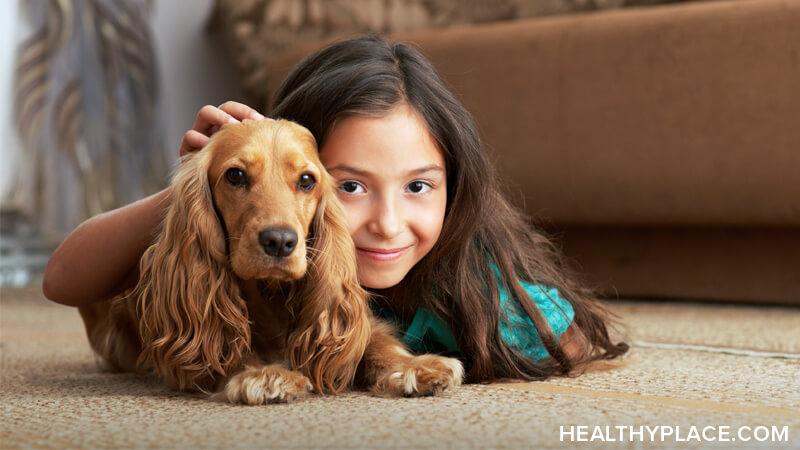Mental Health Benefits of Pets for Children with ADHD, DMDD

There are mental health benefits of pets for children with mental illness. Pets can be great friends and teachers to children with attention-deficit/hyperactivity disorder (ADHD), disruptive mood dysregulation disorder (DMDD), or other mental health concerns. Plenty of research exists backing up the helpfulness of having animals in therapy, school, or at home. My son's mental health benefits from the animals in his life.
Mental Health Benefits of Pets for My Son
There are multiple alternative approaches to mental health treatment, and animal-assisted therapy is one of them. From what I've read, it doesn't matter the type of animal that works with a child but, rather, what a child's connection is to that animal. My husband and I are cat people. My children grew up with three cats, now sadly down to one old lady cat. My son has loved our cats, but unlike my daughter, he's never felt compelled to play with them, feed them, etc.
It turns out he's a dog person. We learned this when a therapy dog program started work with him and his friends in the emotional and behavioral disorder (EBD) classroom at school. Every Tuesday, they spend time training the dogs to complete an obstacle course. At the end of the semester, they put on a dog show for the entire school.
The fact that children with intense anxiety, sensory issues, or other behavior concerns get up in front of the whole school speaks volumes to the power of the program. Watching our son engage on the stage with the dogs also convinced my husband and me to foster dogs at home to see if they fit our family's lifestyle. We ended up keeping our second foster, an older mellow dog who hasn't been phased in the least by our rambunctious children or the crabby cat.
The Many Health Benefits of Pets for Children with Mental Illness
Part of my son's DMDD is the oppositional and defiant behavior. We ask him to do something, and he'll do it maybe a quarter of the time. I didn't expect him to invest in caring for a dog. My son has surprised us, though, in that he's developed a routine of taking the dog out every morning, often without us asking. He complains occasionally but he does it. He also took part in obedience classes, lasting almost the whole hour of instruction each week, to help towards training our dog to be a therapy animal himself.
The benefits of an animal at home for children with emotional and behavioral disorders include promoting impulse control, improving confidence and building the capacity for empathy. Animals are shown to decrease symptoms of depression and anxiety. In therapy sessions and schools, therapy animals have been shown to improve social interactions, decrease behavioral issues, and increase participation.
Health Benefits of Pets: Is a Pet Right for You?
Ultimately, the answer to that question is up to you and your family. Some children with mental illness may exhibit behaviors that are dangerous to animals. The outbursts that come with DMDD, for instance, may terrify an animal or put them in the way of flying objects and flailing limbs.
Luckily, our dog is unphased by outbursts, and when my son goes into his outbursts, he is not in the range of the animals. Maybe he does this subconsciously. I don't know. That could be one benefit of a pet for children: encouraging a child to have a moment of forethought, even if it's just to move out of the way of the animal when angry.
Our home definitely benefits from pets. Overall, they make the anxieties of life a little bit easier to handle for all of us.
APA Reference
David, M.
(2017, December 31). Mental Health Benefits of Pets for Children with ADHD, DMDD, HealthyPlace. Retrieved
on 2026, January 23 from https://www.healthyplace.com/blogs/parentingchildwithmentalillness/2017/12/pets-and-kids-with-adhd
Author: Melissa David
I can really relate to the benefits you speak of when we add pets into the lives of our mentally ill children. Like your son, my bipolar daughter really tries to curb her rages in front of her rescue dog. She says she doesn't want to "scare my baby" and does everything she can to remove herself from the dog before exploding. Her need to reassure and comfort the dog after a meltdown has now expanded to the point where she also checks on the human members of the family to be sure we're all okay also. Finally, because she wants to have the dog certified as an emotional support dog, she is really pushing herself to work on training--a kind of self-discipline that was hard to find before she began caring for her dog. Thank you for sharing.